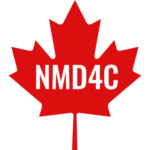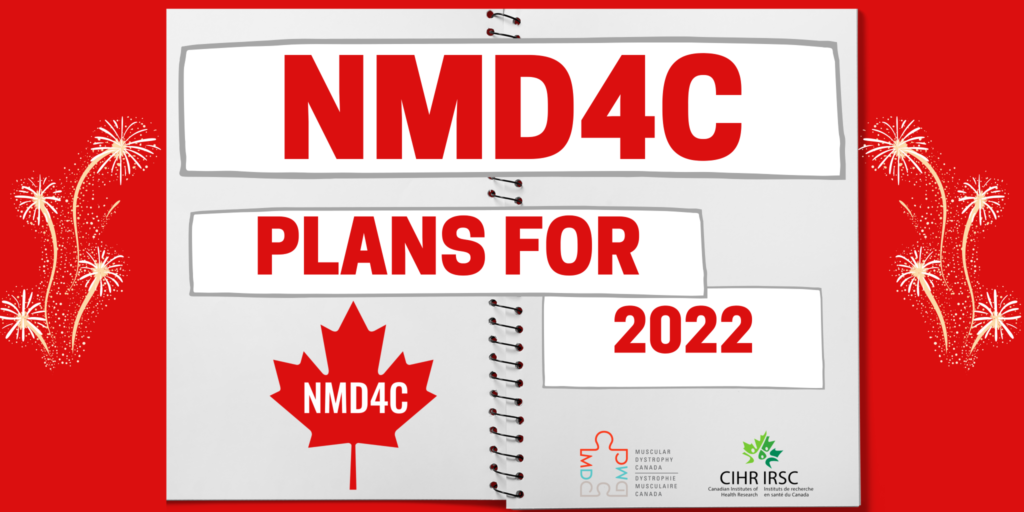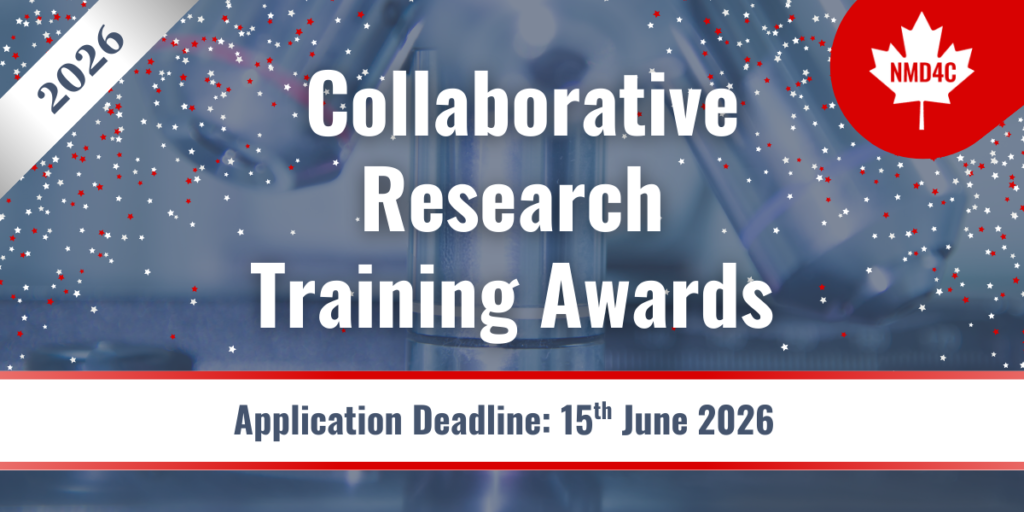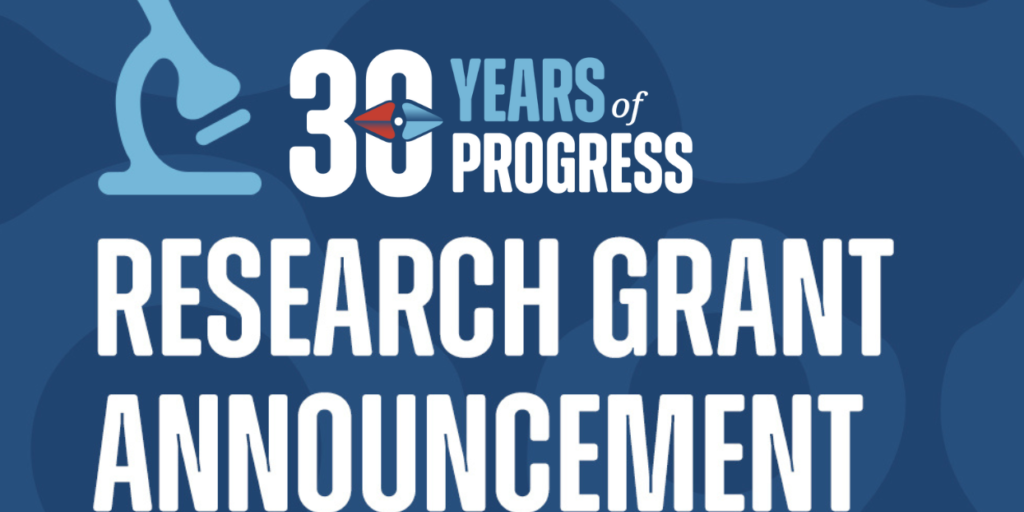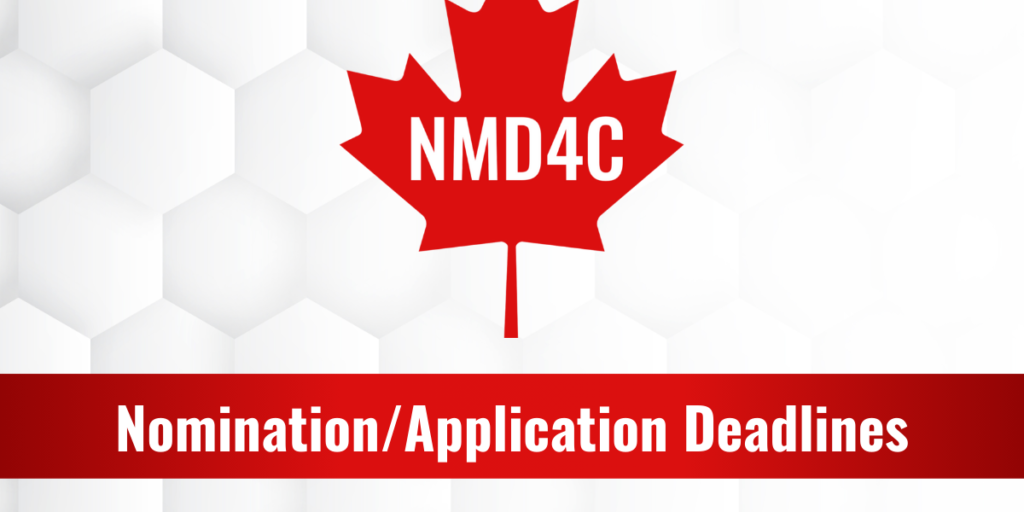NMD4C Plans for 2022
The advent of 2022 marks the NMD4C’s third year of operations, and the network would like to take this time to share our plans for the year to come!
Thank you to our steering committee, our working group members and leaders, and both of our partners and funders, the Canadian Institute of Health Research (CIHR) and Muscular Dystrophy Canada (who are an integral part of every working group). We are grateful for the opportunity to serve the Canadian neuromuscular community and will continue to work on the behalf of all neuromuscular stakeholders in the coming year.
To learn about what the NMD4C accomplished over the past year, read our 2021 Year in Review.
Advocacy
In partnership with MDC and our other partner organizations, the NMD4C will continue to provide input and feedback to decision makers to help inform decisions related to access to treatments and therapies.
Webinars & Communications
The NMD4C will continue to promote network news, neuromuscular events and opportunities and engage with our members on social media and the website; find us on Twitter, Facebook, and LinkedIn. The network will continue to host a monthly CPD-accredited webinar series in partnership with MDC. We will be hosting a calendar of events with not only our own webinars, but also non-NMD4C talks, forums, and conferences for the Canadian neuromuscular community in 2022. Please visit the events page of the NMD4C for more information!
Curriculum Development
The network’s curriculum development team will continue hosting quarterly neuromuscular mystery case rounds as a part of NMD4C’s monthly webinar series, and a network member will also present on behalf of the NMD4C at the Can-GARD National Gand Rounds as a part of their Leading Strand series. The curriculum group will also begin development of a virtual neuromuscular roadmap, providing neuromuscular training in the form of expert presentations on a variety of neuromuscular subjects. To further unite the neuromuscular training community, the group hopes to build a working group with the fellowship program directors from across Canada.
Expert Patient Capacity Building
The expert patient capacity building (EPCB) working group will deliver a network-wide patient-oriented research (POR) training webinar to build POR knowledge and culture within the NMD4C’s work, deploy five patient partners to three network projects, and create and share a POR resource catalogue on the NMD4C site. The team will develop training modules based on the framework for NMD-specific training for patient partners and researchers, evaluate the training modules, and develop a structure within the NMD4C for POR sustainability.
Early-Career
The NMD4C early-career (EC) working group works with the early-career neuromuscular community to provide a wide variety of leadership, training, and networking opportunities. In 2022, the EC group will continue to provide leadership opportunities to EC clinicians and researchers by inviting EC members to chair and/or present at NMD4C webinars, and have EC representation on the majority of working groups. The EC group will also publish one EC blog or profile monthly to help introduce EC researchers and clinicians to the neuromuscular community. To further provide opportunities for connection, the NMD4C will host two EC events or forums in 2022. As in 2021, the EC team will aim to secure sustainable funding for clinical neuromuscular fellowships and postdoctoral research fellowships through ongoing partnerships with MDC and the Canadian Society of Clinical Neurophysiologists (CSCN).
Knowledge Translation
The objectives of our integrated knowledge translation (IKT) plan is to raise the standard of care for NMD and improve access to NMD therapies across Canada through the development, dissemination, and implementation of KT products (including clinical care guidelines) tailored to various audiences. In 2022, the KT team plans to further develop the consulting services for NMD4C members through webinars and website resources, develop shared-decision making tools around treatment decisions including an SMA decision-aid, and produce KT products from clinical guidelines in the form of infographics. The group will also update NMD-specific clinical practice guidelines, with the team aiming to develop/adapt clinical practice guidelines for oculopharyngeal muscular dystrophy and myotonic dystrophy, and will also produce a series of “Five things to know” style papers for different NMDs.
Biobanking
The biobanking team will continue to unite the Canadian neuromuscular biobanking community and build a centralized virtual biobanking catalogue. The team will hire a full-time biobank developer in 2022, who will join biobanking lead Dr. Jason Karamchandani at the Montreal Neurological Institute to develop and launch a virtual neuromuscular biobank catalogue listing all Canadian neuromuscular samples available for research, and develop a digital consent tool to enable the use of clinical samples for research. The team will also continue to refine a biobank framework and standards of practice for sample and data collection, harmonize inter-institutional and -provincial transfer agreements, and begin collaborating with international biobank initiatives to connect with researchers globally. The biobanking group will form an advisory committee to provide guidance on these non-renewable sample requests to the biobank.
Clinical Trials
In 2021, the network hired Bonnie Wooten as the clinical trial concierge whose work has united stakeholders in the Canadian neuromuscular clinical trial landscape including clinicians and trial sites, partner organizations, industry and people affected by NMDs. While this work will be ongoing in 2022, the clinical trial team will also develop a neuromuscular clinical trial education course to increase the capacity and availability of trial sites, and continue to grow the profile of Canadian neuromuscular clinical trial sites through establishing relationships with clinical trial sites internationally, work which has already begun through the collaboration with the Care and Trial Site Registry.
Patient Registries
The network will continue to work closely with the Canadian Neuromuscular Disease Registry (CNDR) to: incorporate FAIR data principles (Findable, Accessible, Interoperable, Reusable) into datasets, update existing disease modules, and support academic and industry-led research using its datasets and resources. In the coming year, the CNDR will form the basis of a FAIRification plan as a result of the FAIRification pilot study using the CMS registry, produce a new dataset for CMS developed in alignment with EURO-NMD, and finalize SMA updates in alignment with Treat-NMD. The CNDR will use the results of the patient survey launched in 2021 to guide the strategy for a direct-to-patient dataset, with input from MDC and Jesse’s Journey, with the eventual goal of creating a direct-to-patient portal to facilitate registry data collection. The CNDR will continue to seek opportunities for involvement in research projects in 2022, using social media and webinar presentations to share the opportunities to implement new datasets to the broader, multi-disciplinary network and to highlight the use of registry data in research.
The network would not be where it is today without the hard work of our members. Thank you to each of our investigators, working group members, early-career contributors, and everyone who has been involved in any of the NMD4C’s work packages over the previous two years as well as our partners and funders CIHR and MDC, without whose generous support our work would not be possible.
